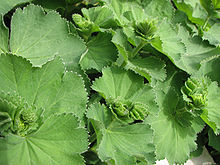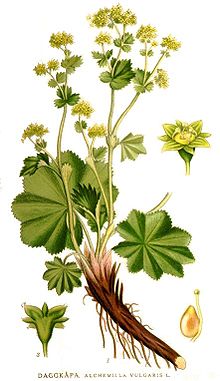Alchemilla
 From Wikipedia the free encyclopedia
From Wikipedia the free encyclopedia
This article needs additional citations for verification. (January 2022) |
| Alchemilla | |
|---|---|
 | |
| Alchemilla vulgaris | |
 | |
| Botanical illustration of Alchemilla vulgaris | |
| Scientific classification | |
| Kingdom: | Plantae |
| Clade: | Tracheophytes |
| Clade: | Angiosperms |
| Clade: | Eudicots |
| Clade: | Rosids |
| Order: | Rosales |
| Family: | Rosaceae |
| Subfamily: | Rosoideae |
| Tribe: | Potentilleae |
| Subtribe: | Fragariinae |
| Genus: | Alchemilla L. |
| Type species | |
| A. vulgaris | |
| Species | |
| See text | |
| Synonyms[1] | |
| |
Alchemilla is a genus of herbaceous perennial plants in the family Rosaceae, with the common name lady's mantle applied generically as well as specifically to Alchemilla mollis when referred to as a garden plant. The plant used as a herbal tea or for medicinal usage such as gynaecological disorders is Alchemilla xanthochlora or in Middle Europe the so-called common lady's mantle Alchemilla vulgaris. There are about 700 species, the majority native to cool temperate and subarctic regions of Europe and Asia, with a few species native to the mountains of Africa and the Americas.[2]
Most species of Alchemilla are clump-forming or mounded perennials with basal leaves arising from woody rhizomes. Some species have leaves with lobes that radiate from a common point and others have divided leaves—both are typically fan-shaped with small teeth at the tips. The long-stalked, gray-green to green leaves are often covered with soft hairs, and show a high degree of water-resistance (see Lotus effect). Green to bright chartreuse flowers are small, have no petals and appear in clusters above the foliage in late spring and summer.
Selected species
[edit]- Alchemilla abyssinica Fresen.
- Alchemilla alpina L. — alpine lady's mantle
- Alchemilla argyrophylla Oliv.
- Alchemilla barbatiflora Juzepczuk
- Alchemilla bursensis Pawł.
- Alchemilla conjuncta Bab.
- Alchemilla diademata Rothm. — diadem lady's mantle
- Alchemilla ellenbeckii Engl.
- Alchemilla erythropoda — dwarf lady's mantle
- Alchemilla filicaulis Buser — thinstem lady's mantle
- Alchemilla flabellata Buser — fan lady's mantle
- Alchemilla glabra Neygenf. — smooth lady's mantle
- Alchemilla glaucescens Wallr. — waxy lady's mantle
- Alchemilla glomerulans Buser — clustered lady's mantle
- Alchemilla gracilis Engl.
- Alchemilla hungarica Soó
- Alchemilla japonica Nakai & H. Hara
- Alchemilla jaroschenkoi Grossh. — holotrichous lady's mantle
- Alchemilla johnstonii Oliv.
- Alchemilla lapeyrousii Buser — Lapeyrous' lady's mantle
- Alchemilla mollis (Buser) Rothm.
- Alchemilla monticola Opiz — hairy lady's mantle
- Alchemilla orbiculata Ruiz & Pav.
- Alchemilla sericata Rchb.
- Alchemilla splendens Christ ex Favrat
- Alchemilla stricta Rothm.
- Alchemilla subcrenata Buser — broadtooth lady's mantle
- Alchemilla stuhlmanii
- Alchemilla subcrenata
- Alchemilla subnivalis Baker f.
- Alchemilla triphylla Rothm.
- Alchemilla venosa Buser — boreal lady's mantle
- Alchemilla vestita
- Alchemilla vulgaris L.
- Alchemilla wichurae (Buser) Stefanss. — grassland lady's mantle
- Alchemilla xanthochlora Rothm.
References
[edit]- ^ "Alchemilla L." Plants of the World Online. Royal Botanic Gardens, Kew. Retrieved 14 January 2022.
- ^ "Alchemilla L." Atlas of Living Australia. Archived from the original on 2018-08-31. Retrieved 2018-02-11.